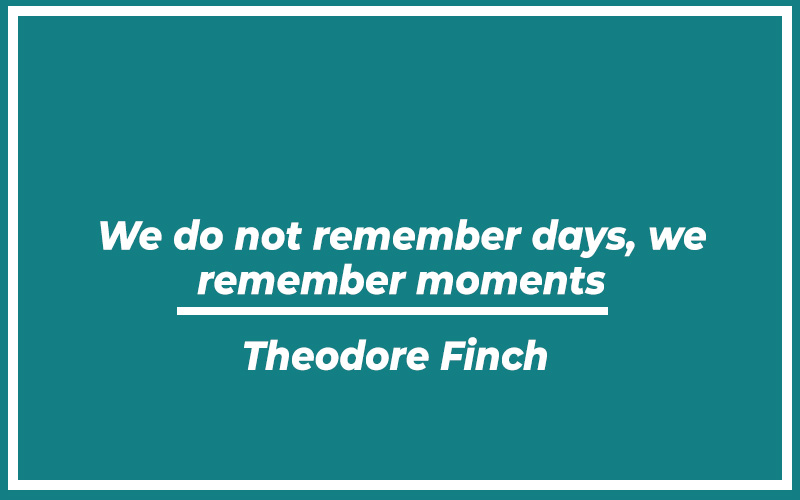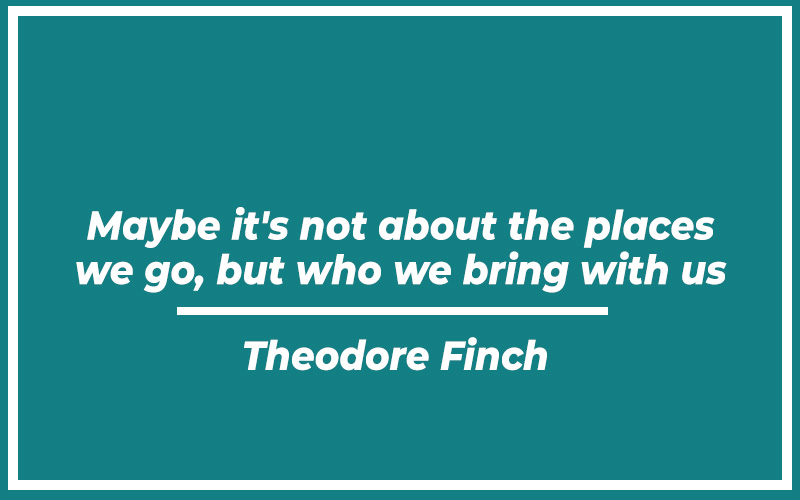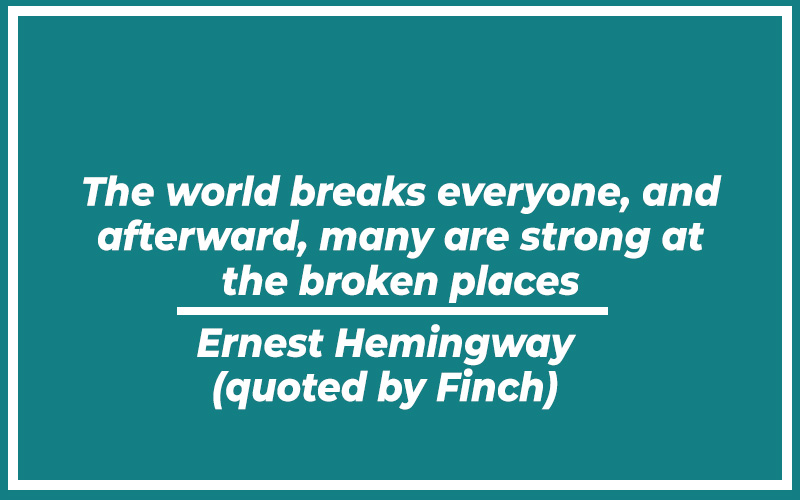Have you ever read a book that tore you apart in the most gut wrenching way? Jennifer Niven’s All The Bright Places is such book. This is a book about dealing with depression, grief, hope, and the wonder of honest human connections.
The story of Violet and Finch was so compelling that it landed on bestseller lists and eventually earned a Netflix adaptation.
Enjoy some of the quotes from this novel and be swept away by the beauty and vulnerability that is All the Bright Places.
All The Bright Places Quotes

“We do not remember days, we remember moments.” – Theodore Finch
This quote by Theodore Finch highlights the power of fleeting moments in shaping our memories. While days may blur together in a monotonous routine, specific moments, both joyful and sorrowful, can leave a lasting impact on us.
Finch suggests that focusing on these moments, savoring the good and learning from the bad, can create a richer tapestry of our experiences. This can involve keeping a gratitude journal to record positive moments, reflecting on challenging experiences to find lessons learned, or simply being more present in the current moment to appreciate its unique beauty.
“The problem with people is they forget that most of the time it’s the small things that count.” – Violet Markey
Violet Markey’s observation challenges the tendency to overlook the everyday acts of kindness and connection. Grand gestures and dramatic pronouncements are important on certain occasions, but it’s often the small things that truly matter in building and maintaining healthy relationships.
This quote reminds us to appreciate a listening ear offered during a difficult time, a helping hand with a mundane task, or a shared smile with a stranger. By incorporating these small acts of kindness into our daily lives, we can make a significant impact on ourselves and those around us.
“Sometimes there’s beauty in the tough words—it’s all in how you read them.” – Violet Markey
Violet Markey offers a new perspective on harsh or difficult words. While negativity and criticism are never desirable, sometimes difficult truths can be disguised as harsh language. Finch suggests that if we approach these words with an open mind and a willingness to learn, we might discover valuable insights or opportunities for growth hidden within the perceived negativity.
This doesn’t mean accepting abusive language, but rather approaching criticism with a critical eye, discerning constructive feedback from negativity, and using it as a catalyst for self-improvement.
“You are all the colors in one, at full brightness.” – Theodore Finch
Theodore Finch’s quote is a beautiful metaphor for embracing one’s individuality. We are all a unique blend of emotions, experiences, and perspectives.
Finch encourages us to celebrate this vibrant mix, shining our light brightly and authentically for the world to see. This might involve expressing ourselves creatively through art, music, or writing, or simply being comfortable in our own skin and letting our personalities shine through in our interactions with others.
“The great thing about this life of ours is that you can be someone different to everybody.” – Theodore Finch
This quote by Theodore Finch highlights the multifaceted nature of human identity. We present different versions of ourselves to different people, depending on the context and relationship.
Finch suggests that this flexibility is a strength, allowing us to connect with others on a deeper level while remaining true to ourselves. For example, we might be silly and playful with friends, professional and composed at work, and nurturing and supportive with family. The key is to ensure that these different facets all contribute to a genuine and authentic whole.
“I learned that there is good in this world, if you look hard enough for it.” – Violet Markey
Violet Markey’s realization offers a message of hope in the face of darkness. Life is full of challenges and negativity, and it’s easy to become discouraged. However, there is also an abundance of good waiting to be discovered if we actively seek it out.
This quote encourages us to maintain a positive outlook, actively searching for the beauty and kindness that exist in the world around us. This might involve volunteering in our communities, helping those in need, or simply appreciating the small moments of joy that surround us each day.
“A prayer. It’s so lovely to be lovely in Private. Sorry wastes time. You have to live your life like you’ll never be sorry.” – Theodore Finch
Theodore Finch’s unconventional “prayer” emphasizes living authentically and embracing the present moment. Dwelling on past mistakes or fearing future regrets is a waste of time and energy.
Finch suggests living life to the fullest, expressing our true selves without fear of judgment, and taking action without being paralyzed by the fear of saying or doing the wrong thing. This doesn’t mean being reckless or inconsiderate, but rather approaching life with courage, vulnerability, and a willingness to learn from both successes and failures.
“I’m a map of all the places I’ve been and all the places I’ve never gone.” – Theodore Finch
Theodore Finch’s metaphor highlights the idea that our experiences, both real and imagined, shape who we are. The places we’ve visited physically contribute to our understanding of the world, while the “places we’ve never gone” represent our dreams, aspirations, and unexplored potential.
Finch suggests that embracing both aspects of our being creates a rich and multifaceted identity. This might involve reflecting on past experiences, creating vision boards for future goals, or simply allowing ourselves to dream about the possibilities that lie ahead.
“You have to take risks. You have to jump. Once in a while, you gotta jump off the cliff and build your wings on the way down.” – Theodore Finch
Theodore Finch’s words encourage us to embrace challenges and step outside our comfort zones. Growth often occurs when we take risks and venture into uncharted territory.
Finch suggests that sometimes we need to take a leap of faith,trusting that we will learn and grow from the experience. This doesn’t mean being reckless, but rather approaching opportunities with courage and a willingness to adapt as we go.
“I promise you, there are places that can make you whole again.” – Theodore Finch
Theodore Finch’s message offers hope and a sense of possibility in the face of loss and grief. While healing takes time,there are experiences and places that can help us feel more whole again. Finch suggests that seeking out beauty,connection, and new experiences can contribute to the healing process.
This might involve spending time in nature,exploring new hobbies, or reconnecting with loved ones. Finding solace in these places can be a powerful step towards healing and rediscovering joy in life.
“And you know what? Maybe we can create our own sunshine.” – Violet Markey
Violet Markey’s realization offers a sense of empowerment and agency in the face of darkness. Life inevitably throws challenges our way, but we also have the ability to create our own light and happiness.
Violet suggests that focusing on positive thoughts, nurturing our passions, and surrounding ourselves with supportive people can create a sense of joy and resilience. While external circumstances may be difficult, we can choose to cultivate a positive outlook and create our own sunshine within ourselves and our relationships.
“You can’t write a story if you’re too afraid of what might happen next.” – Theodore Finch
Theodore Finch’s metaphor highlights the importance of embracing the unknown and taking risks in life. Fear of failure or disappointment can paralyze us and prevent us from pursuing our dreams.
Finch suggests that approaching life as a story being written allows us to embrace the journey, learn from mistakes, and rewrite chapters as needed. This doesn’t guarantee a perfect ending, but it allows us to actively participate in shaping our narrative and embracing the possibilities that lie ahead.
“Sometimes you need to lose yourself to find yourself. I know that sounds weird, but it’s true.” – Theodore Finch
Theodore Finch’s paradox highlights the potential for growth through challenging experiences. Losing our sense of self,whether due to loss, heartbreak, or a major life change, can be a disorienting experience.
However, Finch suggests that these experiences can also be opportunities for self-discovery and personal growth. By navigating these challenges, we can gain new perspectives, develop resilience, and emerge with a stronger sense of who we truly are.
Also Read: Top Tyler the Creator Quotes (with Explanations)

“Maybe it’s not about the places we go, but who we bring with us.” – Theodore Finch
Theodore Finch’s quote emphasizes the importance of human connection in experiencing the world. While beautiful locations can be inspiring, it’s the people we share them with that create lasting memories and enrich our journeys.
Finch suggests that focusing on building strong relationships and fostering deep connections can add meaning and joy to even the most ordinary experiences. This might involve spending quality time with loved ones, exploring new hobbies together, or simply appreciating the everyday moments shared with those who matter most.
“You can’t erase someone’s history. You can’t pretend it never happened.” – Violet Markey
Violet Markey’s observation highlights the importance of acknowledging and processing past experiences. Ignoring or trying to erase past traumas or challenges can hinder our growth and well-being.
Violet suggests facing our past experiences with honesty and courage, allowing ourselves to heal and learn from them. This might involve therapy, journaling, or simply talking to trusted friends or family members. By acknowledging the past, we can move forward with greater clarity and emotional resilience.
“You are not obligated to win. You are obligated to keep trying. To the best of your ability. Every day. That’s all there is.” – Theodore Finch
Theodore Finch’s words offer a powerful message about resilience and perseverance. Success is not guaranteed, but we can control our effort and attitude. Finch encourages us to keep trying, even when faced with setbacks. This doesn’t mean pushing ourselves to the point of burnout, but rather approaching challenges with dedication and a willingness to learn from mistakes.
The journey towards our goals is just as important as the destination, and every attempt, no matter the outcome, contributes to our growth.
“Sometimes you have to let go of the life you planned in order to have the life that is waiting for you.” – Theodore Finch
Theodore Finch’s quote acknowledges that life rarely goes according to plan. Sometimes, unexpected detours lead us to even better destinations. Finch encourages us to be flexible and open to new possibilities. Clinging too tightly to a rigid plan can prevent us from seeing opportunities for growth and happiness that may arise unexpectedly.
Trusting the process and letting go of control allows us to embrace new adventures and discover a life that might be even better than what we originally envisioned.
“There is only one me I’ve ever really liked, and he was good and awake as long as he could be.” – Theodore Finch
Theodore Finch’s words highlight the struggle with mental illness and the importance of self-compassion. Mental health battles can make it difficult to see ourselves clearly and appreciate our own worth. Finch’s statement suggests a disconnect between his true self and the way his illness makes him feel.
This quote is a reminder to be kind to ourselves, even when we’re struggling. Mental illness doesn’t define us, and self-compassion is essential for healing and growth.
“Everywhere we go becomes part of us, if you pay attention.” – Theodore Finch
Theodore Finch’s metaphor emphasizes the impact of our experiences on shaping who we are. The places we visit, the people we meet, and the things we learn all contribute to the tapestry of our being. Finch suggests being present and mindful in our experiences, actively absorbing the lessons and beauty that surround us.
This might involve keeping a travel journal to capture memories, practicing gratitude for the people in our lives, or simply taking the time to appreciate the sights and sounds of our everyday environments.
“It’s my experience that people are a lot more sympathetic if they can see you hurting, and for the millionth time in my life I wish for measles or smallpox or some other easily understood disease just to make it easier on me and also on them.” – Violet Markey
Violet Markey’s observation highlights the societal stigma surrounding mental health and the importance of open communication. Mental illness can be an invisible struggle, making it difficult for others to understand the pain and challenges we face.
Violet wishes for a more easily identifiable illness, suggesting that open communication about mental health issues can foster compassion and understanding. This quote encourages us to talk about our struggles, seek support, and help break down the stigma surrounding mental illness.
“We are all just stories, in the end. Just a collection of moments strung together and read out loud.” – Theodore Finch
Theodore Finch’s quote offers a unique perspective on human existence. Our lives can be seen as a collection of experiences and memories, woven together into a narrative that defines who we are.
Finch suggests that embracing these moments, both joyful and sorrowful, contributes to the richness and complexity of our stories. This can involve journaling to capture experiences, sharing stories with loved ones, or simply reflecting on the past to appreciate how it has shaped us into who we are today.
“And maybe the point of life isn’t to find yourself, but to create yourself.” – Theodore Finch
This quote by Theodore Finch challenges the notion of a fixed, pre-determined self. Finch suggests that our identities are not set in stone; they are constantly evolving through our experiences and choices.
He encourages us to take an active role in shaping who we want to be, pursuing our passions, and growing into the best versions of ourselves. This might involve trying new things, learning new skills, or simply stepping outside our comfort zones to explore different aspects of ourselves.
“But, you know, even the brightest light burns out if you don’t let it breathe.” – Theodore Finch
Theodore Finch’s metaphor highlights the importance of self-care and taking breaks. While pursuing our goals and passions is important, neglecting our well-being can lead to burnout and hinder our progress.
Finch suggests allowing ourselves time to rest, recharge, and reconnect with ourselves. This might involve setting boundaries between work and personal life, prioritizing activities that bring us joy, or simply taking time for solitude and reflection. By taking care of ourselves, we ensure we have the energy and resilience to keep shining our light brightly.
“Maybe we’re all a little broken. That’s how the light gets in.” – Ernest Hemingway (quoted by Finch)
This quote, originally by Ernest Hemingway but referenced by Theodore Finch, offers a beautiful perspective on vulnerability and resilience. Life inevitably leaves its mark on us, and we all experience challenges and setbacks.
However, Finch suggests that these cracks in our armor can also be openings for growth and connection. By embracing our vulnerabilities and sharing our experiences, we allow others to see us for who we truly are and create opportunities for deeper connections.
“You deserve better. I can’t promise you I’ll stay around, not because I don’t want to. It’s hard to explain. I’m broken, and no one can fix me. … You deserve better.” – Theodore Finch
Theodore Finch’s words highlight the complexities of mental health and the importance of setting boundaries in relationships. While Finch’s desire to protect Violet is understandable, his self-deprecating thoughts and inability to seek help ultimately create distance and pain.
This quote is a reminder that we can’t control the actions of others, but we can choose to prioritize our own well-being and surround ourselves with people who support our growth and healing.

“The world breaks everyone, and afterward, many are strong at the broken places.” – Ernest Hemingway (quoted by Finch)
This quote, again by Ernest Hemingway but referenced by Theodore Finch, explores the concept of post-traumatic growth. Experiencing hardship and challenges can leave us feeling broken, but it can also make us stronger and more resilient.
Finch suggests that these “broken places” can become sources of strength and wisdom, shaping who we are and how we navigate the world. This doesn’t diminish the pain of past experiences, but it acknowledges the potential for growth and transformation that can emerge from them.
“And in that moment, I understood the truth of what Finch had been showing me all along: You don’t have to be strong to be brave. Sometimes the bravest thing you can be is simply weak.” – Violet Markey
Violet Markey’s realization highlights the importance of vulnerability and accepting help. Finch’s struggles with mental health challenged the traditional notion of strength as stoicism and independence.
Violet learns that true bravery lies in acknowledging our weaknesses, seeking support, and allowing ourselves to be vulnerable. This quote reminds us that asking for help is a sign of strength, not weakness, and that true connection often comes from sharing our vulnerabilities with others.
Also Read: Top Tyler the Creator Quotes (with Explanations)
Final Thoughts
All the Bright Places isn’t a fairy tale, but it is a reminder that the darkest days give birth to light. These quotes capture the messy emotions, the tough questions, and the small moments of joy that make up life’s journey. They remind us that it’s okay to not be okay, that talking about our struggles is important, and that connection with others can help us heal.
So next time you’re feeling lost or down, remember, there’s a whole world waiting to be explored, and there are people who care about you.

